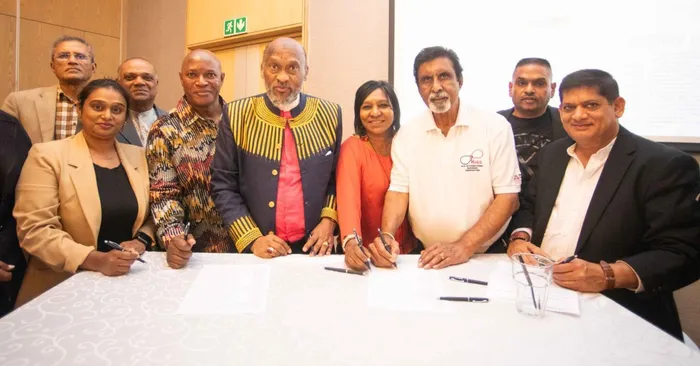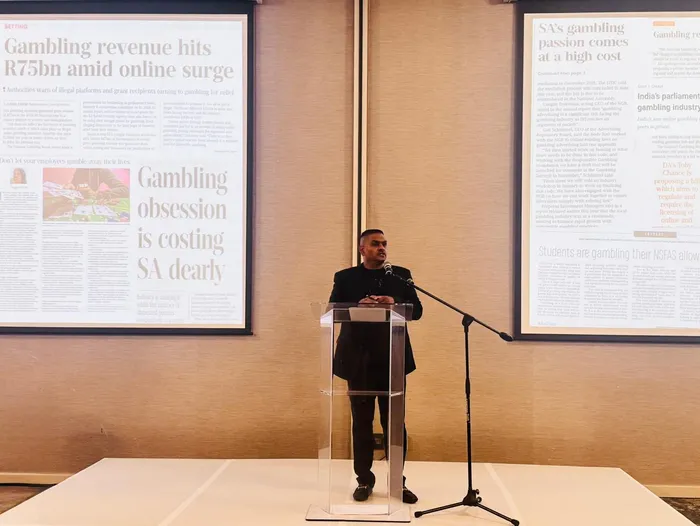107 organisations unite to combat 'silent epidemic' of online gambling
Coalition

Organisations signing the Civil Society Declaration on the Harm of Online Gambling, calling for an outright national ban on all forms of online gambling.
Image: Supplied
OVER 100 organisations have united in South Africa to call for a complete ban on online gambling, which they describe as a 'silent epidemic' devastating families and targeting youth.
The coalition has launched a 90-Day National Call to Action, demanding immediate legislative changes and enforcement measures to combat what they view as an urgent national crisis.
Led by community activist Brandon Pillay, the event at the Radisson Blu Hotel, brought together civil society organisations, women’s groups, faith-based institutions, health and social services, and advocacy movements.
The 107 organisations signed the Civil Society Declaration on the harm of online gambling, calling for an outright national ban.
Their mission: to launch a National Call to Action against the growing harm of online gambling, which they said was ravaging families, fuelling debt, and preying on the youth.
“Our nation faces a silent epidemic, the rapid rise of online gambling that preys on our youth, destroys families, and undermines our national wellbeing. This is not a moral panic; it is a national emergency,” said Pillay.
The memorandum, which was drafted at the event, called for Parliament to follow India’s example by banning all forms of online gambling outright.
It included a list of immediate demands including: a mass national march, a ban on gambling advertising, a freeze on new licences, and the establishment of a National Enforcement Task Force to crack down on illegal operators and amendments to the National Gambling Act to permanently outlaw digital gambling and criminalise unlicensed operators.

Dr Brandon Pillay speaking at the Community and Civil Society Call to Action event.
Image: Monishka Govender
“Today, we stand not against entertainment, but against exploitation; not against technology, but against its abuse. Together, we can end the harm. Together, we can protect our nation,” said Pillay.
Edwin Mkhize, the KZN secretary of COSATU denounced the exploitation of workers through unregulated online betting apps.
“Workers’ hard-earned salaries, meant for basic amenities, vanish into digital gambling run by faceless corporations. Our nation’s wealth is siphoned off into offshore bank accounts. If we unite behind this cause, victory is certain,” said Mkhize.
Muni Kooblal, President of Child Welfare KZN, who described online gambling as “a fast-spreading social crisis” and “a mental-health emergency.”
“What begins as a harmless bet quickly becomes an addiction that destroys lives. Behind every click lies the potential for financial ruin, depression, and broken families,” said Kooblal.
Citing statistics, he noted that 42% of South Africans gambled monthly, with up to half of social grants among young people spent on gambling.
He added that gambling addiction had one of the highest suicide rates among behavioural disorders, underscoring the urgent need for action.
“Our youth are the greatest casualties. Online gambling apps are designed to look like harmless games. This is digital exploitation at its most dangerous,” said Kooblal.
He called for South Africa to emulate India’s total ban.
“Regulation will not stop this cancer, it only legitimises it. To protect our children and our future, we must cut this disease out at its root,” he added.
Some of the online gambling statistics shared by Kooblal:
- About 42% of South Africans gambled monthly, and was a rising social concern
- Up to 50% of social security grants to younger groups was blown on gambling, according to research by Experian and Vault22.
- The middle market spent 38 to 50% of their income on gambling - 30% more than on groceries.
- Affluent groups were spending 10 to 12% on gambling, though their behaviour appears to be more controlled.
- Because online casino and interactive gambling remained illegal, the major growth area was online-accessible betting (sports, contingencies, horse racing, etc.).
- According to a study by the National Gambling Board, 73.6 % ofrespondents said that gambling by family members had a negativeimpact on my welfare (NGB)
- The study also showed that 77.8 % of respondents affirmed thatgambling could lead to domestic violence
- About 28.0 % of households earning less than R 2 000 pm participated ingambling (South African Bookmakers and Association)
- Among unemployed persons, 30.2 % gambled (South AfricanBookmakers and Association)
- Consumers that engaged in gambling activity exhibited higher levels offinancial distress than those that do not participate in gambling activities.
The conference also featured insights from legal and regulatory experts who highlighted the fragmented nature of gambling oversight in South Africa.
Dhilosen Pillay, former chairperson of the Free State Gambling, Liquor and Tourism Board, criticised the weak regulatory framework.
“The National Gambling Board was born out of the national act. The board does not exist. The provincial legislature, provincial acts and provincial gambling acts issued the license to bookmakers. But the games that are being played have nothing to do with casinos.
“For the term online gambling, you do not have a licence. There is a bookmaker’s licence, which is a fixed-odds licence. The National Gambling Board, formed in 2004, was disbanded in 2014. So we have the administrator, and it’s impossible for the administrator to take into consideration all factors pertaining to gambling,” said Pillay.
He said that online gambling platforms likened themselves to online sports betting to get away with their online gambling games but failed to realize that the licences was only permitted geographically.
“The gambling platforms, you walk to the store, you take a bet on sports and get a ticket but there is a geographical location where the license is approved. The provincial board did not only approve those casino games, but have taken other games, like slots games online.
“So now when you are gambling, you are gaming from a different location. The problem is the provincial gambling. They should not approve their skills. The national ministers should cancel all games pertaining to slots and the problem will be solved,” said Pillay.
Adding to the legal debate, Advocate Saleem Khan SC emphasised that much of online gambling remained unlawful under national law.
“Sports betting is legal under certain conditions but many operators are hiding behind that legality to run unlicensed online casinos. It’s time for decisive prosecution.
“The bookmaker is like the different organisations that are competing. What they are saying in essence is that sports beating is allowed online, it is legal, so what we are doing is similar to sports betting. Therefore, because that is lawful, this is lawful. Section 11, makes online, unlawful, except for those which are specifically authorised for sports betting. It is a matter of prosecution.
“The problem stems from provincial boards issuing bookmaker licences that now include online slot games, something never intended under the law. This is a loophole that could be closed in ten minutes if the political will existed,” said Khan.